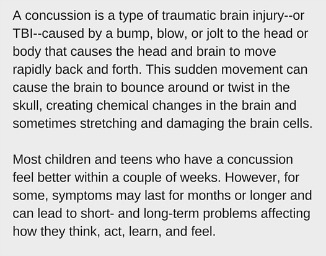If you've been to the movies recently, you've probably seen a preview for Will Smith's film, Concussion. In the movie, Smith portrays Dr. Bennet Omalu, the neuropathologist who first identified chronic traumatic encephalopathy (CTE) in a retired star player for the National Football League.
In social media, on the news, and now in a major motion picture, more people are talking about concussion and its long-term impact on professional athletes, their careers, and their families. As director of CDC's Injury Center and an emergency department physician, I see this growing attention paid to concussion as an important opportunity for broadening the conversation.
For more than a decade, CDC's National Center for Injury Prevention and Control has helped advance the public health response to concussion. Through our HEADS UP campaign, we have put concussion educational materials into the hands of coaches, parents, athletes, and school and health care professionals nationwide.
Based on our research, we know that prevention is possible. We've made youth sports concussion one of our focus areas, but we can't solve this issue alone. All of us play a role in creating a culture of concussion safety.
Here's how we can prevent sports-related head injuries.
- Change the "win-at-all costs" mentality. There's no doubt young athletes like to win, but they don't only play sports to win a championship. Many young athletes play sports because it's fun. Pushing a "win-at-all costs" mentality not only makes athletes less likely to want to participate, it also puts them at risk for injuries, such as concussion. Telling athletes to "tough-it-out" or "shake-it-off" when they might have a concussion isn't just wrong, it's dangerous. No athlete with a possible concussion should feel pressured to keep playing out of fear of losing the game or letting down their parents, coaches, or teammates.
Films like Concussion help raise the awareness of all Americans about this threat to young athletes. The vast majority of them won't ever play sports in front of millions of fans at the professional level. And that's okay. But young athletes deserve to play sports in a culture that celebrates their hard work, dedication, and teamwork - in a safe environment. Join us in helping to stop concussions so that young people can learn the important, lifelong lessons of team sports.
